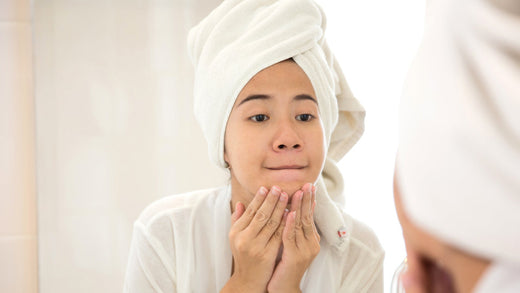
Acne-Fighting Solutions That Get The Job Done
If you suffer with regular breakouts we bet you often wonder about the best skincare ingredients for acne. Well, wonder no more, we got you.
Acne breakouts, whatever your age, are no joke. They can be frustrating, confidence-destroying, challenging and sometimes downright painful. Nobody wants that. But sometimes life just deals you a bad hand, and being prone to breakouts (or not) is exactly that. You don’t get pimples, blackheads and whiteheads because you have poor personal hygiene or eat too much chocolate. You get them because your genes dictate the makeup up of your skin and, in this case, are encouraging it to produce too much oil. This excess oil (or, more specifically, sebum) then teams up with dead skin cells and bacteria to have a party in your pores, leading to all sorts of congestion and potential breakouts.
Granted, it’s all well and good knowing your pimples aren’t your fault, but this doesn’t make them go away. So what can you do to control oil production, balance your skin and help keep zits from upsetting your mojo? Well, understanding what you put on your skin and, more specifically, knowing which skincare ingredients mean business is a great place to start.
Behold the best ingredients for acne-prone skin – in our (and most skin experts') humble opinion.
Tea Tree Oil
Tea tree oil is an essential oil that’s steam distilled from the leaves of the melaleuca alternifolia (tea) tree. Chock full of antibacterial and anti-inflammatory qualities, it’s been used for centuries to heal the skin, and as an acne-fighter, it’s pretty unstoppable.
Exactly how does tea tree oil work on acne? For starters, it works hard to kill certain acne-causing bacteria that sit on the surface of the skin. Couple this with its ability to calm redness, reduce swelling and soothe irritation and it becomes a great choice for anyone wanting to deal with breakouts with a natural, effective skincare ingredient.
Word to the wise, however, tea tree oil is full-on potent so you should never apply it in its purest form. Instead, leave it to the pros to curate an effective formulation you can use every day.
Salicylic Acid
Keeping your skin ticking over is super important if you’re susceptible to the slings and arrows of blocked pores and acne breakouts. When your skin fails to turn over at a reasonable rate, dead skin cells get stuck at the surface, where they love to hang out in your pores causing total havoc.
As you may know, the rate at which your skin turns over seriously slows down as you get older. This is why it’s super important to kick-start this process with exfoliation. Scrubs are great for removing dead skin cells and encouraging the skin to turn over more efficiently, but to really tackle acne-prone skin, your best bet is to choose skincare containing salicylic acid.
Salicylic acid is a beta hydroxy acid (BHA) which means it’s a oil-soluble chemical exfoliant. Hydroxy acids work by breaking down the bonds between your skin cells so they slough away easily and make way for the new stuff. However, unlike glycolic acid, which is a water-soluble alpha hydroxy acid (AHA), BHAs cut through grease which gives them the extra edge with oily skin, allowing them to truly work on your sebaceous glands and balance oil production.
Another point in salicylic acid’s favor? It has anti-inflammatory and antibacterial properties. And if you have angry pimples or facial redness, you’re so going to want to get in on that.
Try: 6% AHA, BHA + PHA Liquid Exfoliant
Retinol
A go-to in the skin aging world, retinol, a topical form of vitamin A, also offers some pretty impressive results for acne-prone skin. Who knew? Well, we did, but then again that’s what we’re paid for!
Similar to exfoliating acids – although it works very differently to salicylic acid and friends – retinol promotes cell turnover to ensure your pores stay clear of unwanted dead skin cells. Instead of breaking down the bonds between dead skin cells, however, retinol works by attaching itself to nuclear receptors in the center of each living cell where it activates certain genes to accelerate turnover.
It might not be the most obvious choice for when your skin breaks out, but use it on a regular basis and it’s been proven to reduce the frequency and improve the severity of breakouts. Plus, if you’re of a certain age, you get all the added age-fighting benefits as an added bonus. Put like that, it seems silly not to.
Try: Retinol Moisturizer
Niacinamide
If you’re stuck with the double-whammy of acne and sensitive skin, you’ll know only too well how difficult it is to find skincare formulations that improve your breakouts but don’t irritate your skin. The struggle is real. However, it’s not impossible. And one ingredient that should top your must-tries? Niacinamide.
Niacinamide (vitamin B3) is one of the most effective active ingredients for sensitive skin. It also makes the list for best ingredients for acne-prone skin. And that’s no mean feat.
As well as being one of our favorite antioxidants, working hard to counteract the damaging effects of environmental free radicals, niacinamide also increases the production of ceramides in the skin’s uppermost layers. Ceramides enable the skin to remain strong, supple, hydrated and able to protect itself from unwanted irritation. Sweet.
But what about acne breakouts? Which is why we’re here, after all. Well, niacinamide has been proven to reduce inflammation (check), regulate sebum production (check) and it can even help minimize the appearance of enlarged pores when used regularly and together with a great cleansing regime. Research also shows it may have antimicrobial effects, helping to destroy acne-causing bacteria that may be lurking in your skin’s microbiome. Hells yeah!
Try: Niacinamide (B3) Facial Serum
Finally, A Few Important Things To Remember
1. Always patch test new ingredients on a small area of skin before regular, all-over use. Not sure how to do this? No problem, here's a guide on how to patch test your skincare products.
2. Introduce potent, active ingredients gradually into your skincare regime. Start once or twice a week to begin with, then build slowly as your skin acclimates. This will allow the product to work its magic with fewer risks of irritation.
3. Apply broad-spectrum sunscreen every day, without fail. Active ingredients encourage fresh skin cells to the surface, so they need extra TLC to protect them from UV damage. No arguments.
4. Don’t expect miracles overnight. Skincare formulations that treat at a deeper level aren’t an immediate fix so be patient and give them the time they deserve – two to three months is usually the sweet spot.
5. Skincare alone may not be enough to manage persistent or severe acne, so consider seeking professional help from a dermatologist if yours simply won’t go away.















